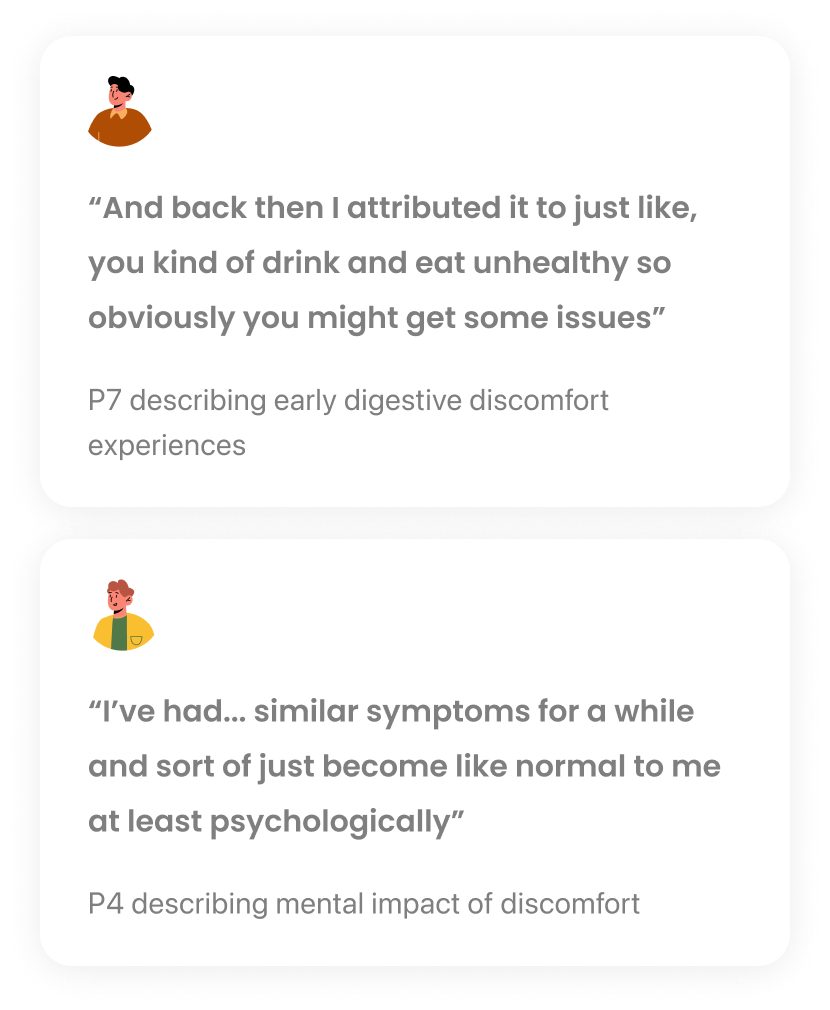
Fox Tracks
Addressing the unique challenges of people living with chronic digestive discomfort
My graduate capstone project focused on supporting individuals suffering from functional gastrointestinal disorders (FGIDs) like Irritable Bowel Syndrome. Our team conducted generative research and designed a product that meets users’ individualized digestive needs. I defined and led the UX research, ultimately using our research findings to shape key features of our design.
Fox Tracks is an integrated smartwatch & mobile lifestyle tool that optimizes digestive data logging and uncovers personalized digestive insights to ultimately improve the user’s overall quality-of-life.
Institution
University of Washington MHCI+D Capstone
Duration
6 months
(Mar. - Aug. ‘23)
My Role
Generative Research
Design Strategy
Team
1 UX Researcher (me)
1 Product Manager
2 UX Designers
Table of Contents
Problem Space • Research Approach • Research Findings • Design Response • Research Impact
Problem Space
We focused on Functional Gastrointestinal Disorders because all of our team members suffer from chronic digestive discomfort in one form or another. Symptoms and triggers of FGIDs vary wildly between individuals.
FGIDs are frustrating because each person must embark on a lifelong journey to build a healthy relationship with their gut.
What are functional gastrointestinal disorders (FGIDs)? They are characterized by persistent and recurring GI symptoms with no observable physical root cause (such as an ulcer).
25 million Americans have FGIDs
2nd leading cause of missing work or school, after the common cold
50-80% of people with FGIDs don’t consult a doctor
Source: UNC School of Medicine
Research Approach
Auto-Ethnography
We conducted auto-ethnographic research by holding a reflexive group discussion. This helped us acknowledge and identify our biases based on our personal experiences with FGIDs.
Generative Research Approach
We chose to run a diary study to ground participants’ experiences in their daily life and followed up with moderated interviews to dig deeper into needs, attitudes, and behaviors to answer our central research question:
How do individuals with FGIDs identify their triggers and manage their symptoms, if at all?
I put together the research plan by creating the format, formalizing the research objective, leading diary study activity ideation, centralizing interview questions across group members, and defining the auto-ethnographic research activity.
Methodology: Diary Study + Semi-Structured Interview
Participants: 10 participants who experience chronic digestive discomfort with diversity across age, gender, race, digestive symptoms, and management methods
Figure 1: Photo artifacts from diary study activities
Figure 2: Notes from auto-ethnography
Research Synthesis
We used inductive coding to start synthesis. Additionally, I performed deductive coding using the intersectional framework to understand how identity factors affect digestive health. I led an affinitization session using the first set of themes from coding as a starting point.
Figure 3: First set of themes based on coding
Figure 4: Affinitization of themes with each participant color coded
User Journey Map
We created a user journey map highlighting lifecycle stages of living with FGIDs. I analyzed the user journey map and highlighted 3 high-value pain points to address in our design.
Figure 5: User journey map with 3 pain points outlined in green
Research Findings
Clarifying participant behavior by uncovering underlying motivations
Finding #1
When considering triggers, participants engage in a trade-off between digestive discomfort and other quality-of-life factors.
Participants often choose to eat their digestive trigger foods or engage in trigger activities because they prioritize other quality-of-life factors such as taste, convenience, or spending time with others.
Finding #2
Mental health and digestive issues have a cyclical relationship since stress & anxiety are both symptoms and triggers.
Participants describe how poor mental health exacerbates their digestive discomfort.
Research shows mental health is directly related to gut health through the ‘gut-brain connection’*.
Finding #3
Participants tough out their digestive discomfort to avoid making drastic lifestyle changes.
Participants experience inertia when considering lifestyle changes they perceive as drastic - those that trigger a sense of loss or cognitive dissonance. In an effort to sustain their enjoyment of daily life, they choose to ‘tough it out’ and deal with the consequences.
Figure 6. Picture and emojis from P7’s diary study (eating a meal with others) and quote from follow-up interview
Finding #4
Persistent symptoms can be normalized, making it challenging to identify potential chronic issues.
Participants have an ambiguous notion of what is ‘normal’ based on what they hear from their community and societal norms. It takes awhile for participants to realize that their discomfort may not be ‘normal’ and an actual digestive disorder.
Design Response
From our research, we learned that triggers and symptom management methods are deeply personalized. The most widely recommended FGID ‘solution’ - the elimination diet - is too drastic and lacks empathy for individuals who are already suffering. We came up with the following design challenge:
How might we support individuals with FGIDs as they navigate their personal journey with digestive health?
Fox Tracks: FGID Lifestyle Support Animal
Fox Tracks is an integrated smartwatch & mobile experience that empowers individuals with FGIDs to make healthier lifestyle decisions for their digestive health. With the help of Foxy, their digestive support animal, users can:
Discover Personalized Insights
Fox Tracks analyzes the logged data to present personalized digestive insights and relevant digestive education. Leveraging these, users create a fine-tuned understanding and repository of their digestive health.
Log Digestive Data
Users can easily log symptoms, food, and biometrics through their smartwatch or on their phone. Users have the choice of logging food through audio, photo, or text entry. Symptoms are logged through a simple swipe interaction and biometrics are logged passively through smartwatch integration.
Feature Deep Dive
Figure 9: Personalized insight cards shared after discovery mode
Applying research findings to feature design using design principles
Principle 1: Sustainable Companionship
Give sustainable support long-term, since digestive health is a lifelong journey.
Foundation in Research
Finding #3: Participants tough out their digestive discomfort to avoid making drastic lifestyle changes.
Feature: Adaptive Modes
Fox Tracks meets users where they are by giving them control over how they want to interact with the app. Stable Mode only requires low-touch symptom & biometric logging. Users can switch to Discovery Mode to discover new triggers, which requires more frequent food logging.
Figure 8: Biometric tracking integration
Principle 3: Autonomy
Give individuals autonomy over their own digestive health journey to inspire self-discovery, acceptance, and empowerment.
Foundation in Research
Finding #1: Participants engage in trade-offs between digestive discomfort and other quality-of-life factors.
Finding #4: Persistent symptoms can be normalized, making it challenging to identify potential chronic issues.
Feature: Personalized Insights
By correlating symptoms with food log and biometric data, Fox Tracks provides personalized digestive insights and recommendations. Users can confirm or dismiss these based on how accurate they feel they are. Weekly Foxy Mail also shares educational tips about living with FGIDs. Users use these together to understand what works best for their body and build a healthy lifelong relationship with their gut.
Figure 7: Stable Mode (left) and Discovery Mode (right)
Figure 10: Visualizing symptoms as weather (left) and user engagement through distance (right)
Principle 2: More Than Just a Diet
Focus on how digestive health is impacted holistically by factors such as mental health, sleep, and co-morbidities.
Foundation in Research
Finding #2: Mental health and digestive issues have a cyclical relationship.
Feature: Biometric Logging
Fox Tracks integrates with Apple Health to collect biometric data such as sleep, heart rate variability (stress), and menstrual cycle. These can be passively tracked through the Apple Watch. These factors are analyzed to understand non-diet related impacts on the user’s digestive health through correlation with symptom logs.
Principle 4: Be Gentle
De-stigmatize FGIDs by talking about it in a positive, supportive, and compassionate way.
Foundation in Research
Finding #2: Mental health and and digestive issues have a cyclical relationship.
Finding #3: Participants tough out their digestive discomfort to avoid making drastic lifestyle changes.
Feature: Fox Mascot
Users are guided through the app with their digestive support animal, Foxy. Foxes are intelligent, sensitive, proactive, and cheeky - qualities that resonate with our brand values. Foxy handles the topic of digestive health with care while also remaining light-hearted.
Reflection
Navigating sensitive topics
As we conducted interviews with participants, some reported substandard and occasionally hostile interactions with healthcare professionals. We learned how to navigate these conversations with empathy & compassion.
Prioritization
Designing a fully fleshed-out product can take years. Since we only had 3 months to design, our team had to prioritize which features and user flows were essential for the minimum viable product.
Evaluative Testing
For this project I worked on a small and agile team of 4. I led us through the generative research process then shifted my focus to help develop and align designs to what we learned. In retrospect, I would conduct feature concept testing in the early stages of our design to evaluate whether our ideas were aligning with user needs.
















